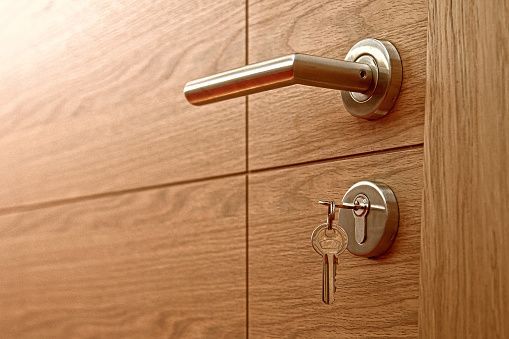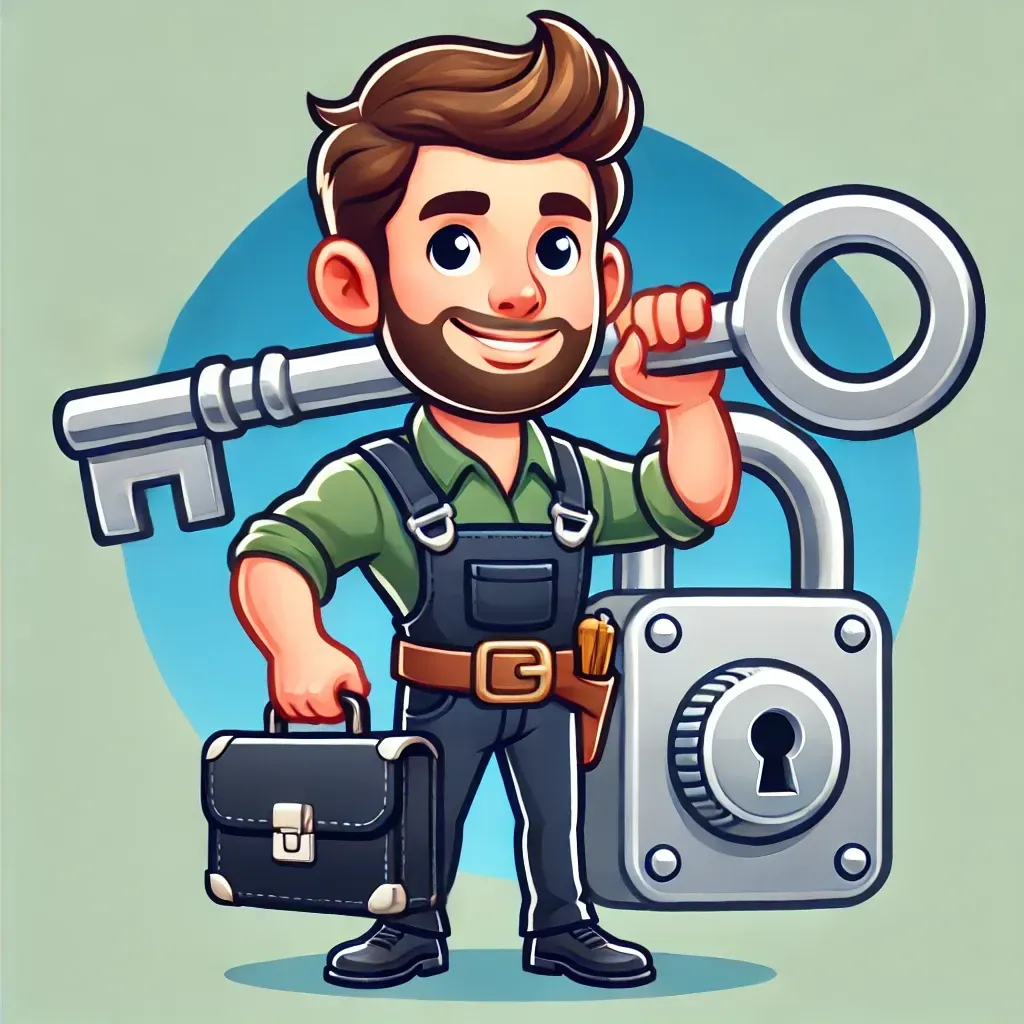Top 5 signs your lock needs to be replaced
July 30, 2025
If you have ever wondered, do locks last forever, we can safely say - they do not.
These are the top 5 signs that you should be looking into changing your locks for new ones.
Whether it's your home, office, post box or storage door lock, a secure and properly functioning door is the first line of defense against burglars and intruders.
Most people, whether they’ve recently purchased their first home or have lived there for decades, don’t think about changing their locks. In today’s world updated and well-functioning door locks are a must!
If your locks are damaged, getting hard to use or you’ve just moved into a new property, you should think about getting your locks changed. In this blog post we will take you through the top 5 signs you’ll need to change your locks!
1 - Wear and tear
Even if older locks seem to be in good working order, it may be safer to replace the locks with a more modern locking system. Over the years security systems and regulations have changed. Most locks of the same standard today, compared to 20 years ago, are a lot better in many ways.
Burglars use a range of sophisticated techniques and equipment to remove or deactivate lock systems, so modern upgrades such as anti snap locks offer far greater protection for your home. Despite what we think about our kitchen appliances, locks are the pieces of mechanical hardware that see the most daily use.
Because we’re constantly locking and unlocking our doors, the locks themselves are subjected to more wear, making them more likely to break down over time. This is especially true if your locks came with your home or apartment, there's no way to tell how old your locks are and definitely no way to confirm if the previous owners used them correctly or if they enjoyed slamming their doors.
If your locks are particularly old, it might be time to replace them. A standard lock with proper care and maintenance could see you through several years but as wear and tear take their hold the risk of failure grows.
2 - Damage/ incorrect use
We have come across so many occasions where the lock has been damaged due to incorrect use. This can happen due to incorrect installation, age and misalignment. It can be the result of excessive jiggling of the key to make it work or even force a door and lock that shouldn't be forced. If your lock is damaged in any way, you may experience issues turning the key or, in the worst case, the door may fail to lock or unlock resulting in an emergency locksmith needing to come out and gain access. If this happens with your door even once, it’s best to be proactive and look into replacement options before you risk a complete lock-out.
3 - New property
Before you celebrate moving into your new, welcoming home, we recommend that you change the entry door locks.
You cannot confirm that the previous tenant has a copy of the key. Even if your house is new, replacing the door lock set with new ones will ensure your peace of mind, or you may consider installing a customize lock or smart lock (such as a smart fingerprint lock, smart card lock) as an additional line of defense. Moving is an exciting (if not slightly stressful) experience where thoughts on décor and getting the Wi-Fi set up are usually top of the list. However, it’s also important to take a moment to think about changing the locks.
Even if the locks are in working order, you never know who might have a key and what their intentions could be. It’s possible that the previous owners still have a spare key somewhere, have given duplicates to children, friends, or neighbours or might even have lost a few.
We always advise that one of the first things you do in a new home is to change the locks. Calling out a local Locksmith to meet you on your move in day is a great way to protect your home, valuables, and family.
4 - Recent local break - in
If you or someone in your neighborhood or apartment complex has been the victim of a recent break-in, it’s almost imperative that you get your locks replaced. If the burglar entered using brute force, it’s likely that the door or locking mechanism is now damaged, making it all the more likely that it won’t shut or lock properly. However, if the burglar entered by picking the lock or using a poorly-hidden spare key, two things are almost certain: your locks are not secure enough, and criminals are likely to target you again. Replacing the lock is the remedy for both issues.After the break-in incident, none of us can be sure if the keys have fallen into the wrong hands. We should not be lucky, it is vital to replace all locks as soon as possible. Otherwise, it leaves your home vulnerable to another burglary. Not only could your locks have been damaged in the attack but it can also mean that your locks weren’t up to scratch security wise. There is unfortunately no sure-fire way to stop a burglary but different locks can come with different security features, making your home more secure and protected against attack. Likewise, it’s not uncommon for burglars to return to a home they have already targeted with the assumption they will be able to get in again, so it’s even more important that you change your locks to protect your home!
5 - Malfunction & manufacturer error
Buildings can shift, basements are built and the earth moves. All these can put additional unseen stress on your door, the hinges and the lock.
Locks are meant to take extreme pressure in a short amount of time. This is usually the best way to protect against a burglary lock attack. However, constant pressure due to misalignment causes breakages and cracks in the internal parts of the lock. This can expose manufacturer weaknesses and cause your lock to malfunction leaving you locked out or in. If your locks haven't been installed by a professional, this will most likely result in issues down the line. A misalignment now, that only causes slight tension on the bolt, can turn into a much ore serious issue when winter comes and the door swells.
This is perhaps the most obvious — and urgent — sign your lock needs to be replaced. If your lock is damaged in any way, you may experience issues turning the key or, in the worst case, the door may fail to lock or open entirely. If this happens with your door even once, it’s best to be proactive and look into replacement options before you risk a complete lock-out.

If you live in Wimbledon’s SW19, you know the vibe - gorgeous tree-lined streets, the buzz of the Wimbledon Tennis Championships, and the charm of the Village or Common just a short walk away. But between the stunning Victorian houses, sleek modern flats, and lively shops on the high street, there’s a catch: lockouts after a late night cheering at the All England Club or the odd break-in, in quieter spots can throw a wrench in your day. Even thing like moving homes or updating your home insurance can come with challenges. That’s when you need a local locksmith you can count on to sort things out fast. At SMS Locksmiths, we're proud to serve Wimbledon and the SW19 area (including Southfields, Merton Park, and Colliers Wood) with 24/7 emergency and planned services. Our DBS-checked, fully insured technicians arrive within 30 minutes, using non-destructive methods and transparent pricing - no hidden fees or call-out charges. Whether you're a homeowner securing your Edwardian semi-detached or a business owner in the Wimbledon Broadway retail hub, we're here to keep you safe. In this guide, we'll cover the top 5 locksmith services we provide to SW19 residents, tailored to local needs like upgrading heritage locks or handling post-match rush lockouts. Read on for practical tips, and remember: prevention is key to peace of mind. 1. Emergency Lock Opening: Back Inside in Minutes, No Damage to basic locks Nothing disrupts a Wimbledon evening stroll like realising you're locked out - keys forgotten after a coffee at Gail's or a tennis viewing party. Our lock opening service gets you back in fast using advanced pick-and-decode tools, bypassing tools and years of skill and experience, avoiding costly door damage. • Why Wimbledon residents love it: SW19's mix of old sash windows and modern uPVC doors means quick, non-destructive entry is essential. We handle everything from front doors to sheds and post boxes without a trace. • Real-life example: A local family in Southfields called us at 10 PM after misplacing keys during a dog walk on the Common. We arrived in 25 minutes, opened the lock in under 10, and advised on a spare key safe. • Pro tip: Always keep a copy of your keys with a family member or a person you trust, but call us immediately for lockouts - DIY attempts often lead to bigger bills. No matter the time, our 24/7 team ensures you're not stranded. Customer review: "SMS saved our night - professional and stress-free!" – Wimbledon Village resident (5 stars on Trustpilot). 2. Lock Changing: Fresh Security for New Starts in SW19 Moving into a charming Wimbledon flat or after losing keys? A lock change is your first line of defence against unknown access. We replace old locks with high-quality, British Standard (BS3621) compliant options that meet insurance requirements. • Tailored for Wimbledon: Many SW19 homes have outdated rim locks on period properties; we swap them for secure euro cylinders or deadbolts that fit seamlessly. • The process: On-site assessment (free quote), removal of old locks, installation (under 45 minutes), and a full test. Costs start from £110, with a 1-year warranty. • Local insight: With rising lettings in Merton Park, tenants often request changes post-move—we've helped dozens secure their new homes and flats without voiding deposits. Don't risk spare keys circulating; a quick change brings instant security. Book via our site for same-day service. 3. Lock Upgrades: Boost Protection Against Wimbledon Burglary Trends SW19 saw a spike in bike thefts and shed break-ins last year, per Merton Council reports. Our lock upgrades modernise your setup with anti-snap, anti-drill cylinders and multi-point systems, deterring thieves in high-traffic areas like Haydons Road. • SW19-specific benefits: Upgrade Victorian night latches to snap-resistant models or add 5 lever British standard deadlocks for Colliers Wood flats – we supply multiple brands for you to choose from on site. • Why upgrade now?: Standard locks fail 70% of tested break-ins; our BS-approved options slash that risk and keep premiums low. • Quick win: A Wimbledon Broadway shop owner upgraded their rear door after a near-miss; no incidents since, and they saved on insurance. We offer free security audits to spot weak points - perfect for families near the tennis grounds during tournament season. 4. New Lock Installations: Seamless Fits for Home or Business Renovating your Wimbledon townhouse or fitting out a new office near Plough Lane? Our lock installation service handles everything from single deadbolts to full master key systems for multi-unit properties. • Local expertise: We specialise in SW19's diverse builds -reinforced locks for ground-floor flats or heavy-duty ones for garage conversions in quiet Merton Park cul-de-sacs. • Step-by-step: Site visit for measurements, custom sourcing (e.g., thumb-turn cylinders for easy exit), professional fitting, and handover with keys and instructions. Most jobs completed in the first visit. • Business perk: For Wimbledon shops and cafes, we install mechanical digital access control for staff shifts, reducing downtime. Invest in lasting quality - our installations come with lifetime advice and no-fuss guarantees. 5. After-Burglary Services: Restore and Reinforce in SW19 A break-in is every homeowner's nightmare, and Wimbledon's green spaces can attract opportunists. Our after-burglary response includes immediate boarding-up, full lock replacements, and forensic-safe repairs to get you secure overnight. • Comprehensive support: We coordinate with police (providing reference numbers for claims), replace damaged frames, board up broken doors and windows to restore security providing you with peace of mind and giving you time to change doors. • Wimbledon focus: In areas like Southfields, where gardens back onto commons, we add perimeter advice like gravel paths for noise alerts. • From the frontlines: After a recent Merton burglary wave, we helped a family in SW19 board up, reinstall high-security locks, and claim via photos - back to normal in 24 hours. Act fast: Delaying repairs invites further risk. We're your second call after the police post-incident, with compassionate, efficient service. Why Choose SMS Locksmiths for Your Wimbledon SW19 Needs? As a family-run business with over a decade in South West London, we know SW19 inside out - from the rush of match days to the serenity of the Common. Our services aren't just fixes; they're tailored solutions with free quotes, 30-minute responses, and eco-friendly practices (we recycle old locks!). Plus, we're fully insured and DBS-vetted for your peace of mind. Ready to secure your Wimbledon home or business? Visit smslocksmith.co.uk to book online or request a free security check. For emergencies, we're just a click away - no postcode too far in SW19! Stay safe, Wimbledon - SMS Locksmiths has your back. #WimbledonLocksmith #SW19Security #EmergencyLocksmith #LockChangeWimbledon #MertonLocksmith ________________________________________ FAQs for SW19 Residents: Q: How quickly can you arrive in Wimbledon? A: Typically 20-30 minutes, 24/7 - no exceptions for rush hour on the A3! Q: Are your services insured for SW19 properties? A: Yes, all work is given a 1 year warranty and compliant with UK standards. Q: What's the cost for a basic lock change in Wimbledon? A: From £110, with no surprises - get a quote today. For more security tips, check our blog or follow us on social for Wimbledon updates!

Below is a more detailed breakdown of each service, which you can place under “Locksmith services we provide in Hounslow”: Lock Changes & Upgrades
If you’ve just moved into a new home or want to increase your security, we can replace your locks with better, more secure models. Whether it’s euro cylinders, mortice locks, deadbolts or master key systems, we can recommend and install insurance-grade products. Lock Repair & Adjustment Locks wear out over time - maybe the key sticks or you force it to turn. We diagnose whether parts can be repaired (springs, levers, cylinders) or whether it requires replacement. We can also realign misaligned mechanisms so things work smoothly again. Emergency Lockout / Non-Destructive Entry Locked out at an inconvenient hour? We specialize in non-destructive entry, meaning we’ll open your door without breaking it. We carry a full set of specialised tools, from lock picks to tensioners, to gain entry safely and professionally. Burglary & Forced Entry Repair If your property has been broken into, we can repair or replace damaged locks, door frames, or hinges. We can also strengthen weak points and offer recommendations to prevent future incidents (e.g. reinforced strike plates, heavy-duty cylinders). Door & Frame Carpentry / Refurbishment Sometimes the door frame, jamb or door edge is also damaged or poorly aligned. We can carry out carpentry, reinforce the frame, repair door edges, or adjust the door fitting so your locks work properly. UPVC / Multi-Point Door & Window Mechanisms UPVC doors and windows often have multipoint locking systems that require delicate handling. We service, repair, or replace gearboxes, locking rods, handles, and cylinders. We can also realign or replace stuck mechanisms so your windows and doors seal properly. Commercial & Business Services For offices, shops, and commercial premises, we offer: Master key systems Restricted key zones Keyholding & emergency access Panic bars, exit devices, and high-security door furniture Mechanical Digital keypad / access control installations Lock re-keying when staff changeover occurs Area Coverage & Availability We cover the TW3 area and nearby zones in Hounslow, including Feltham, Heston, Cranford, and West Drayton. Wherever you are in Hounslow, we strive to reach you fast. We operate 24/7, every day. Even during weekends and bank holidays, we remain on call.



